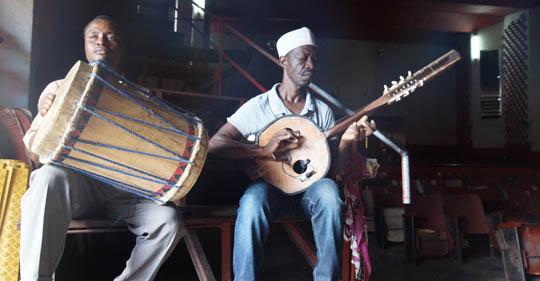|
The Comoro Islands lie in the Indian Ocean to the north-west of Madagascar and are the location for renowned producer Ian Brennan's latest recording. The key to his approach is straightforward in principle, though not necessarily in practice. The aim is to document local music in situ with a minimum of interference, allowing the power of the music and song to be carried on its own terms, but of course things don't always go according to plan. Brennan and his wife and working partner Marilena Delli Umuhoza took six flights to get to Grand Comora, the largest of the islands, hoping to record a seldom heard double-reed pipe called the ndzumara, only to be told on arrival that the last living player of the instrument had recently died. Through word of mouth they made contact with another fine musician and singer called Soubi plus his friend and mentor Mmadi, both of whom they proceeded to record, and We are an island, but we're not alone is the result.
The majority of the Comoro people are living in poverty and Brennan describes in the sleeve notes how the main source of income is sustenance fishing. Soubi and Mmadi present five songs each, on aspects of their everyday life, mainly accompanying themselves on the ndzendze, a box-zither related to the Malagasy valiha, and in Soubi's case also on the gambussi, a type of lute. The vocal styles of the two men are quite different. Mmadi is usually hotly impassioned while Soubi's voice is lilting and melodious, and on "�Mama (Once we had a queen)"� is finely matched with the intricate patterns he plays on the ndzendze.

|
|
Although the titles are given in English the songs themselves are not, so the cause of Mmadi's vocal agitation is not always clear, though on the very brief “America, crazy,” running to less than a minute, he gets straight to the point in what is something of an improvised rant. This also features him blowing a device which comes out sounding somewhere between a kazoo and a duck call. Whether this is a guest appearance by the aforementioned double-reed pipe isn't indicated. Mmadi is accompanied here by drummer D.Alimzé who also provided backing vocals on some tracks.
Mmadi follows this outburst of indignation with the measured and lyrical “The Devil doesn't eat papaya, he eats fire”. The sense of anger has changed to one of resignation and, accompanying himself on the ndzendze, this stands out as one of the most beautiful tracks on the album, while on another track, “Bandits are doing bad deeds,” he delivers what might be described as rural rap, raw and unplugged.

|
|
The music on We are an island, but we're not alone can seem refreshingly simple and unsophisticated, the album publicity describing it as unvarnished, but listen closer and it begins to reveal ways in which it is actually a distillation of different accumulated styles going back for centuries. These islands were first populated by people who had journeyed from south east Asia, later joined by others from the African mainland, the Middle East and Europe, culminating in French colonisation which lasted until independence in 1975. The instruments, their names and the music itself reflect different aspects of that history and those threads remain in evidence. The gambussi, closely related to Madagacar's kabosy, originated in the Middle East and is still found in Indonesia, known as a gambus.
On “I've come to the city (now my shoes are repaired” Sabi accompanies himself on the gambussi, supported by D.Alimzé's drumming and backing vocals in a track lasting over eleven minutes As with several of the tracks the title is wonderfully descriptive but undoubtedly tells only part of the story.
Photo: Marilena Umuhoza Delli
|
